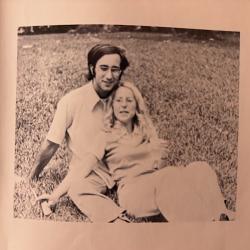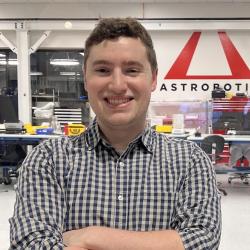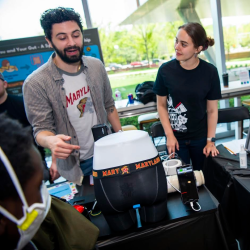Alum Merges Diving Hobby with Decompression Sickness Research
Biological sciences graduate Grant Dong discovers his passion for working with people
In scuba diving, composure is critical. Grant Dong (B.S. ’21, biological sciences) knows firsthand the importance of level-headedness—in and out of the water.
“Even in stressful situations, the first thing to do is slow down and think before you act, and that’s the same philosophy I take into my work and studies,” Dong said. “In a stressful situation like applying to medical school, I’ve been telling myself, ‘It’s OK, you’ll get through this. Just take it one step at a time.’ It’s a life lesson.”
Dong is currently flexing his diving skills while interning with the Divers Alert Network (DAN) in Durham, North Carolina.
 In support of DAN’s mission to promote diving safety by assisting injured divers, Dong is studying decompression sickness, a potentially deadly condition that can occur while diving.
In support of DAN’s mission to promote diving safety by assisting injured divers, Dong is studying decompression sickness, a potentially deadly condition that can occur while diving.
When scuba diving with compressed air, divers take in extra oxygen and nitrogen. Though the body uses the oxygen, inert gasses such as nitrogen and helium dissolve into the body’s tissues where they remain during the dive. This doesn’t cause a problem when below water, but if the diver resurfaces too quickly, the nitrogen forms bubbles in the body that can cause tissue and nerve damage, and in extreme cases, paralysis or death if the bubbles reach the brain. Using ultrasound, Dong is studying these bubbles in divers once they’ve resurfaced.
“Think of a soda can: When you release the pressure from a soda can, the fizz comes out as bubbles. Something similar happens to the body when it resurfaces from diving,” Dong explained. “We want to see how different divers are affected—whether some people bubble more than others and how that relates to decompression sickness.”
Finding Opportunities for Research and Discovery
From the first day he set foot on the University of Maryland campus, the Integrated Life Sciences (ILS) program in the Honors College exposed Dong to many opportunities for research, professional development and community.
“It was really impactful for me to have that network of my peers in ILS to bounce ideas off of and learn about opportunities. We were all taking the same classes and many of us were pre-med, so we were able to chart our courses together in some ways,” Dong said. “And since ILS is a smaller living-learning community, we also get to know the professors a lot better.”
Dong made a strong connection with ILS Associate Director Sabrina Kramer (Ph.D. ’08, cell biology and molecular genetics), who mentored him throughout undergrad and worked with him closely on developing a new honors section of PHIL220: Bioethics: Regulating Right and Wrong.
“The process of articulating my feelings in bioethics helped me to understand myself and my own values, and I was excited to help other students do the same,” Dong said. “I had the privilege of listening to some of my students' most vulnerable stories, and I got much closer with them than I could have with any other class.”
Developing relationships with students in PHIL220H reinforced Dong’s passion for connecting with people. Teaching this course reminded him of how physicians can nurture bonds with their patients while guiding them to their health goals—something that spurred him on toward medical school.
The new section of PHIL220H was a collaboration between ILS and the Department of Philosophy, and Kramer recruited Dong to serve as a teaching assistant for the course—a role that he remained in for three years.
“Considering PHIL220H was a new collaboration, and the Department of Philosophy had no experience with undergraduate teaching assistants, Grant was professional and selfless in his time working with students, and I learned a lot working with him,” Kramer said.
The feeling was mutual. Dong noted that having Kramer’s support—as both teaching assistant and ILS student—enabled him to focus on his students in PHIL220H, as well as his own studies.
“I know Sabrina is always busy running ILS, so I am extremely grateful that she still somehow manages to make time to chat with students about life and give advice,” Dong said. “I've been so fortunate that I've had such a strong advocate and mentor.”
Looking Ahead to Medical School
Through his courses and projects with ILS and his off-campus experience as a medical scribe, Dong realized that he wanted to pursue more opportunities to work directly with people.
“At this point, I’m pretty interested in exploring emergency medicine. I’ve found that I enjoy the pace and I enjoy the chaos of the emergency room,” he said. “But I’ll definitely have to see how things go in medical school. It’s way too early to pick my specialization now.”
With 14 medical school applications submitted and interviews fast approaching, Dong will continue his DAN research while improving his diving skills, appreciating the life lessons he’s learned along the way—even the ones he didn’t expect.
“It’s funny, because freshman year, I never saw myself scuba diving. I got into it sophomore year, and it just kind of built upon itself,” Dong said. “That helped me learn that it’s not bad if things don’t go according to plan. You kind of just have to roll with it and take opportunities when they come. Sometimes, they come from the most unexpected places.”
###
Media Relations Contact: Katie Bemb, kbemb@umd.edu, 301-405-0215
University of Maryland
College of Computer, Mathematical, and Natural Sciences
2300 Symons Hall
College Park, Md. 20742
www.cmns.umd.edu
@UMDscience
About the College of Computer, Mathematical, and Natural Sciences
The College of Computer, Mathematical, and Natural Sciences at the University of Maryland educates more than 9,000 future scientific leaders in its undergraduate and graduate programs each year. The college's 10 departments and more than a dozen interdisciplinary research centers foster scientific discovery with annual sponsored research funding exceeding $200 million.







